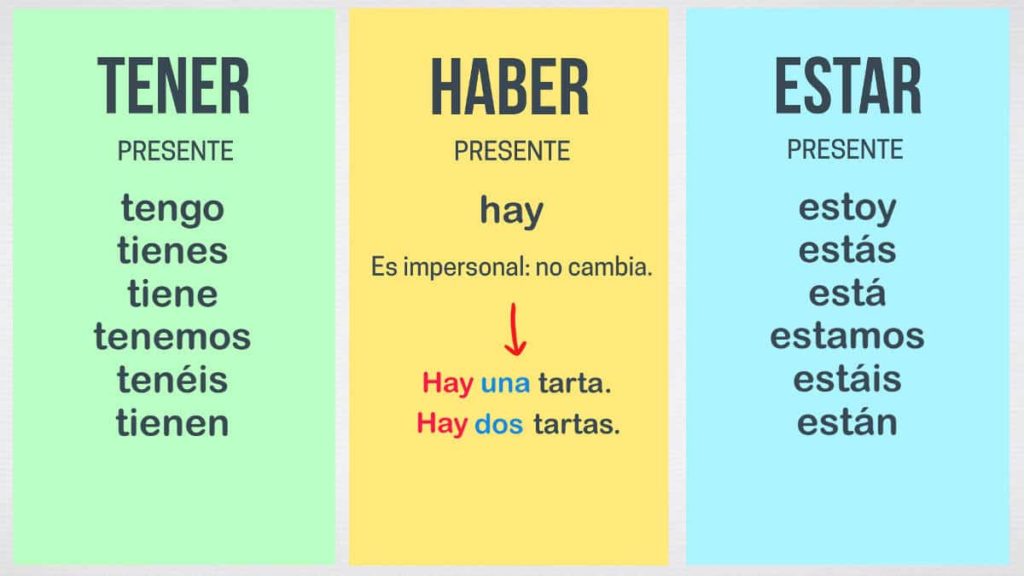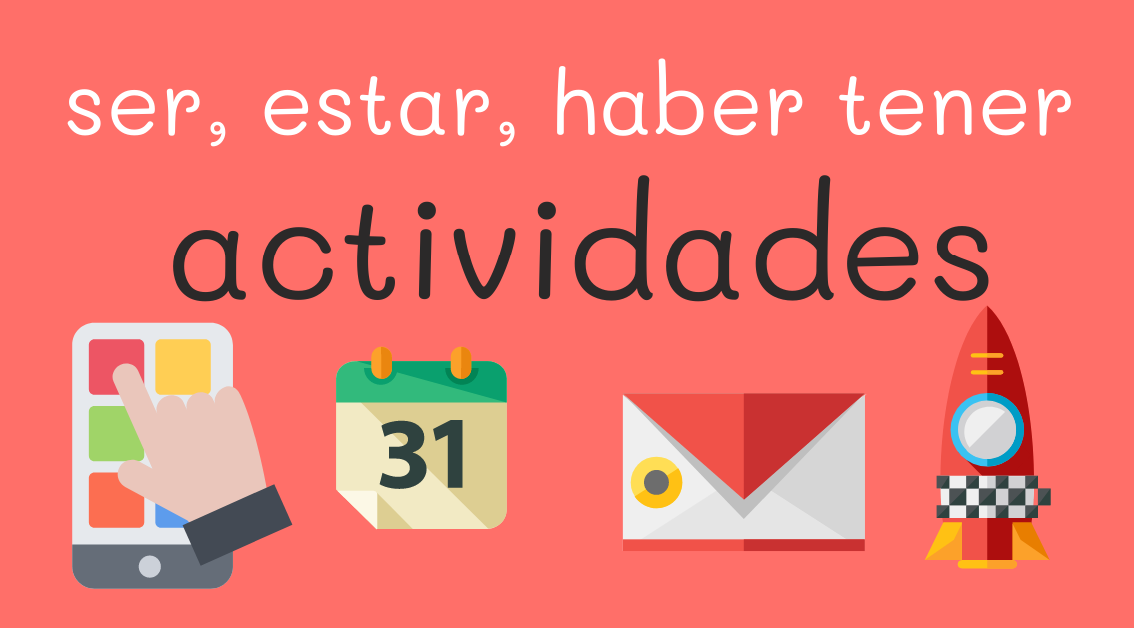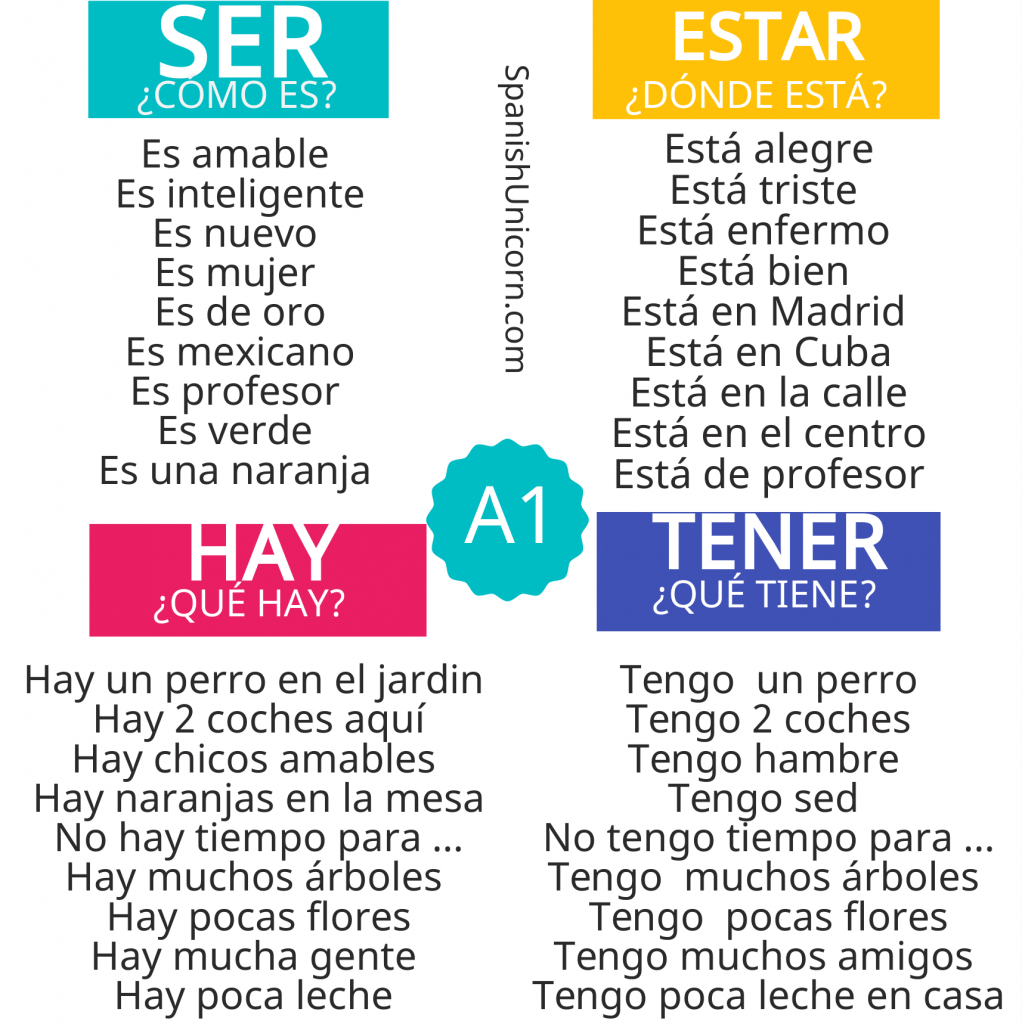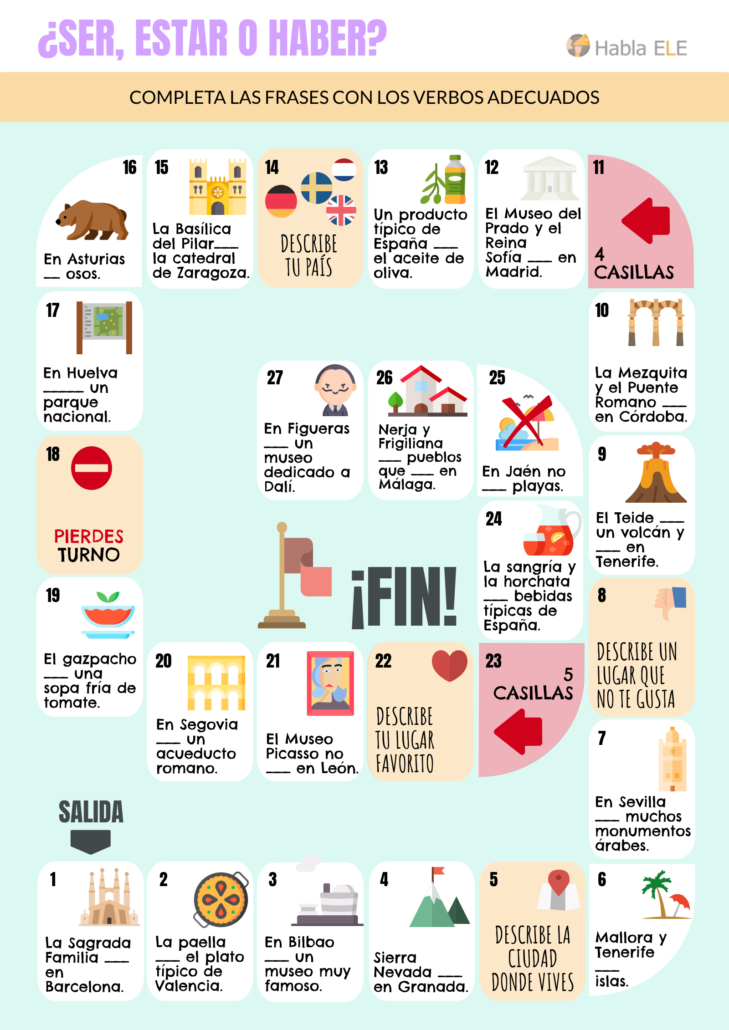
SERESTARHAYTENER quiz AIL Malaga Spanish Language School
A quick and concise breakdown of the differences between ser, estar, and haber in Spanish.

Los verbos HABER y ESTAR La página del español
THE VERB III: SER (TO BE), ESTAR (TO BE) & HABER (TO HAVE) The verbs ser, estar and haber are irregular and used very frequently in Spanish. PRESENT SER: Yo soy Tú eres Él/ella/usted es Nosotros/-as somos Vosotros/-as sois Ellos/-as son USES OF THE VERB SER: 1. Identifying a person: Ella es Ana y él es Juan.(She is Ana and he is Juan) Este edificio es un palacio.

SER, ESTAR, HABER. Describir una ciudad. Lección 11. leccion español
The difference is that haber, typically in the form of hay in the present tense or había for the past, is used to indicate the mere existence of the person or thing. Estar, on the other hand, is used to indicate the location of the person or thing. Note, for example, the difference between these two sentences: No hay presidente.

Blends Worksheets, Spanish Worksheets, Spanish Teaching Resources
The difference between ser and estar is a confusing one. I hope a native can explain this better. There is also a third verb translated as to be. Roughly: Estar: To be located; To be in a mood; To be in a state (eg. dead or alive) To seem, to evoke feeling; Haber in the forms hay / haya: There is / are; Ser: If not otherwise specified, use ser.

HABER X TENER CLAUDIO MUZZIO
ser ancho: be wide: ser apto para: be suitable for: ser astuto: be smart: ser capaz de: be capable of: ser competente en: be competent at: ser culpable de: be guilty of: ser diferente de: be different from: ser dudoso: be doubtful: ser extraño: be strange: ser fácil: be easy: ser falso: be wrong: ser famoso por: be famous for: ser grande: be.

Ser estar tener haber Ejercicios de gramática
Ser - estar - tener - haber - Ejercicios -93. On 02/01/2019 by SpanishUnicorn. SER - ESTAR - HAY - TENER + ejercicios de gramática. Hola chic@s Hoy seguimos practicando. Los ejercicios de gramática de hoy son para nivel A1. ¿Cuándo tienes que usar los verbos ser, estar, haber, tener?

Ejercicios de gramática con ser estar tener haber
Ser, estar, haber. Practica el uso y la conjugación de los verbos "ser", "estar" y "haber" con esta actividad interactiva.

Pin on CASTELLÀ
Ser: Characteristic, describe, identify, express time/date/location, impersonal expressions. Basically, its more permanent then estar. She is always sad, compared to she is sad today. Ella es triste. vs Ella está triste. Estar: Location, Condition, Progressive tense. Temporary, She is sick, not sick-minded

Diferencia entre los verbos 'haber', 'estar' y 'tener' ProfeDeELE
Well, us Spaniards think our language is very important, so we are going to dedicate a full article to each verb that exists. Just joking 😝. Sincerely, the verbs haber, ser and estar are extremely useful and are used regularly within the Spanish language. If you want to have a high level in Spanish, you must learn how to use these verbs.

Preposiciones con ser estar haber tener Preposiciones, Practicas
Ser, estar, haber, hacer and tener are five of the most frequently used verbs, they're a great place to start. Since they all can be used in situations where "to be" or "to become" is used in English, they're usually confusing for students. By breaking them down to their core elements, understanding them becomes much more digestible.
Ser estar haber tener ejercicios en presente
Present Tense of "Ser," "Estar," and "Tener". Ser ( to be ), estar ( to be ), and tener ( to have ), three of the most frequently used verbs in Spanish, are all irregular in the present tense. The present tense conjugations for the irregular verbs ser, estar, and tener are given below, along with some examples.

1000+ images about Ser, Estar, Tener y Haber on Pinterest Spanish
Study the Spanish conjugation with online lessons. Learn the basic grammar rules. There are a number of verbs that have irregular forms other than the "yo" form. Four of the most frequently used verbs in Spanish (ser, estar, ir, and haber) are irregular. The Present Indicative conjugations for each are given below.

Ser, estar y haber Materiales HablaELE
Ejercicio de gramática en español de nivel A1/A2: 'Ser', 'estar' o 'haber' - Completa con la forma adecuada del verbo correcto.. En esta cafetería. muchos tipos de café., Este yogur. caducado, no te lo comas., María. muy golosa, le encantan los dulces., Hoy. muy cansado, tengo mucho t.

martinez Verbos Irregulares Ser Estar Y Haber
The verb to be can be expressed in Spanish by three words ser, estar, and haber. Learners of Spanish frequently confuse the three. Learners of Spanish frequently confuse the three. The main difference between them is that ser refers to inherent a-temporal characteristics, estar describes states and locations, and haber is used to express existence.

Ser Estar Haber Español ELE powerpoints
The following video introduces the basic vocabulary to talk about the weather in Spanish. It explains how to make simple sentences with the verbs SER, ESTAR, HABER and HACE and others. Besides, we will introduce several essential phrases and questions to talk about the weather that you will see later in this lesson with more details.

Ser, estar, haber La página del español
The English verb be has two translations in Spanish grammar: ser and estar. Ser is used for qualities and characteristics and in connection with adverbs of time. Estar describes temporary conditions, location, the present progressive. Learn the difference between ser and estar with Lingolia's online grammar rules and free exercises. Our lists help you learn which words and expressions are.